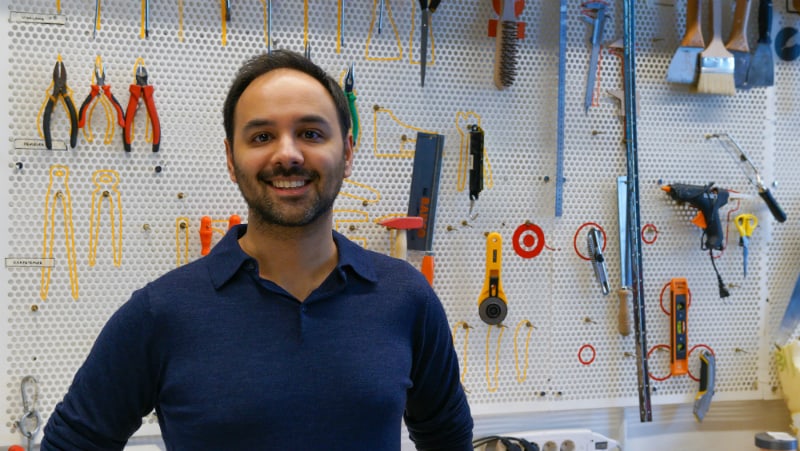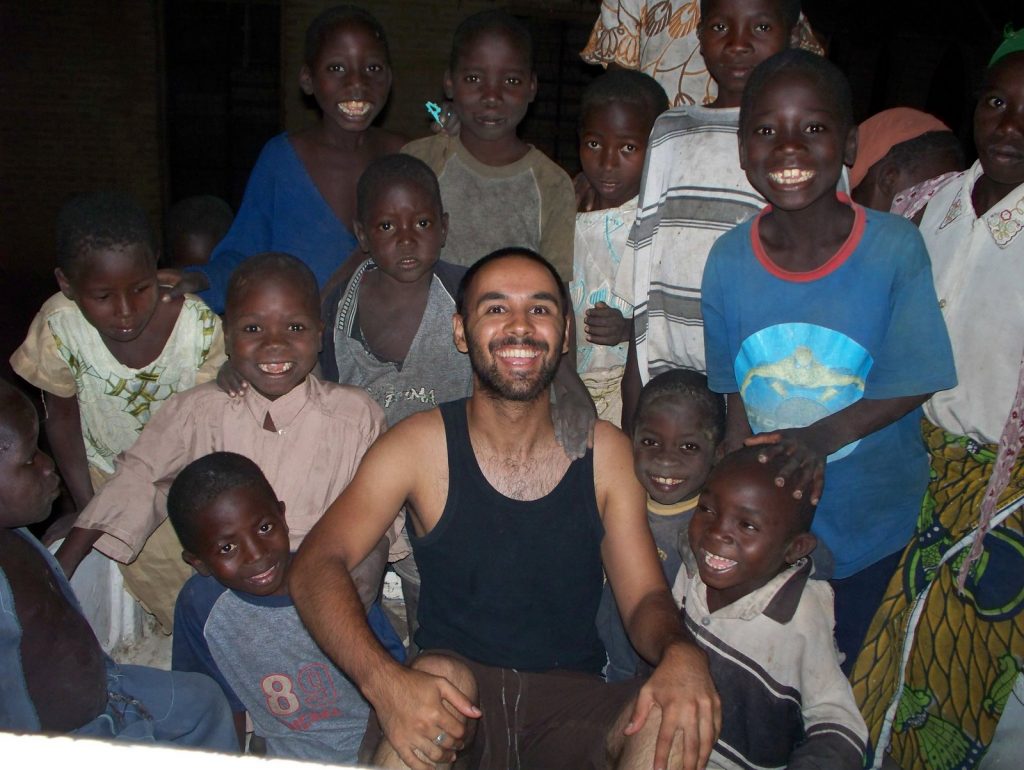The ever-evolving infrastructure of Istanbul evokes a gamut of emotions, ranging from the optimistically awe-inspired to deep-rooted concern. Civil engineering is in many ways the backbone of our chaotic city, while also a field most know little about and often take for granted. Ashkan Rohani has dedicated his life to civil engineering, having volunteered his time in developing areas, and evidenced in part by attaining the prestigious chartered status. With a specialization in bridge engineering, his current project focuses on railway infrastructure in the UK, dealing with structures over 100 years old and carefully ensuring that safety guidelines are met while also extending their lifespan. Having moved to Istanbul for love, taking on such detail-oriented work remotely adds a unique dimension to Ashkan’s work and is testament to the potential of being able to pursue your passions from anywhere in the world.
We took some time to speak with Ashkan on the threads of fate which brought him to Istanbul, the numerous complexities and pressures of civil engineering, the challenges and advancements in working remotely, and even managed to squeeze in a bit of fun trivia on our iconic Bosphorus bridge.

Could you tell us a little bit about yourself? What brought you to Istanbul?
Sure, so I was born and raised in London, where I lived most of my life. I then moved to Bath for my degree, which is a beautiful and quaint city in the southwest of England known for its Roman-built baths and Georgian architecture. There I studied and graduated with a Masters in Civil and Architectural Engineering from the University of Bath. It was actually one fortunate day whilst at university that begun the chain of events that to led me to Istanbul.
I was returning one day on the train from my summer job, when by chance, I met a Turkish girl at the station who was lost and in need of directions, and I was of course more than happy to help; and I am glad I did! Our friendship quickly blossomed and we became very good friends, and it was she who introduced me to one of her best friends, my now wife! After getting married I relocated to Istanbul and have been living here for several years, although my Turkish is still comical! My ethnic background is Persian, which is in many ways very similar to Turkish and has probably made my transition to living here much easier.
I am loving living somewhere new, it is like an adventure for me. I have been lucky enough to travel a lot and experience some amazing things like spending the night in a cave dancing and singing with the Maasai in Kenya, trekking to an altitude of 5300m to see Rainbow mountain in Peru and zip-lining off the Great Wall of China!
Could you elaborate a bit on what civil engineering is? What does being Chartered mean? Do you have an area of expertise?
Civil engineering deals with the design, planning, construction and maintenance of the built environment, i.e. the human-made space in which we all live and work on a day-to-day basis. Civil engineers often work behind the scenes to improve society. Most people are unaware of the many things made possible by civil engineering and often take the benefits of modern life such as sanitation, energy supplies or our ability to travel, for granted.
As a Chartered Civil Engineer, you have demonstrated professional competencies through training and experience against an internationally recognised standard established by a professional association, the Institution of Civil Engineers. Chartered status comes with a professional title ‘CEng’, which is your mark to show that your professionalism, experience, skills and commitment are globally recognised.
My area of expertise is bridge engineering. I am currently the Project Manager for a 5-year framework dealing with the maintenance of railway infrastructure throughout the UK. It’s a very interesting project, dealing with structures that are over 100 years old, which looks at identifying and preventing potential collapses of the nation’s aging bridges whilst trying to extend their life. I have been quite fortunate as since I moved to Istanbul I have had the chance to continue working for my company remotely.

How does ATÖLYE fit into your work?
I have been working from home since moving to Istanbul, which sounds like a dream arrangement, but it has been quite the opposite. After awhile you start to lose your motivation and the line between work and a social life becomes blurred. Probably the worst aspect is the loneliness and lack of face-to-face interaction – which is made worse being in a new country with no friends or unable to speak the language. I had heard of desk rental spaces, but the idea of navigating the busy and crowded Istanbul traffic to go and merely hot-desk didn’t entice me.
It was actually by chance that I stumbled across ATÖLYE, and that’s thanks to Yabangee! I had come to breakfast one morning to bomontiada when I saw one of the Expat Spotlight posters along with the word “Yabangee” spread over it. It immediately caught my attention as I thought “hey I’m a yabanci!”. So later that day I started checking out the Yabangee website (and wishing I had known of it earlier) when eventually I made my way to ATÖLYE. It is honestly an understatement when I say that going to breakfast that morning changed my life!
You see, ATÖLYE is a co-working community that promotes an inspiring and supportive environment. Its fosters the values of collaboration and togetherness, and for me, embodies the Spirit of Ubuntu, an African philosophy that believes you are who you are because of your interaction with the community around you. I have only recently joined, but have already felt a significant positive impact on my work and social life since coming here. I have already met some wonderful people and been exposed to many inspiring ideas, which has encouraged me to focus again on my own project of writing children’s books. I have made more progress and been more productive since starting at ATÖLYE than I was in the past three years!
What are some of the challenges inherent to your work? Are there additional challenges as a result of doing so much remotely?
After the economic crisis winning work has become much more competitive as with most sectors, and clients expect far more value for money. This puts a lot more emphasis on delivering more for less! The work that I do is very safety critical and errors can have serious consequences to people’s safety. So you can imagine it can be quite stressful trying to deliver on budget and on time whilst ensuring mistakes have been identified and dealt with!
Managing a project and a team remotely of course has its own challenges. When you are not physically in the office you can easily lose touch with what your team are doing and if they are progressing on the right track. This often means you end up having to micro-manage, which is just exhausting. As is trying to explain intricate details over the phone or email, rather than being there in person and drawing a sketch.
Recently I have been using Skype for Business to keep in touch with my team and it has had a positive impact on the way we work. We are able to communicate more freely, share our screens to ask questions or go through details and even set up online meetings for the whole team catch up, cutting out the need for numerous emails bouncing back and forth.
I also spend a lot of time talking to clients via Skype calls, so I need a fast and reliable internet connection, which is one of the reasons it was not possible for me to break up my day and change my environment by working in a café as their internet connection is not dependable. Alternatively, working from home has its own issues in Istanbul like day-long power cuts!
The time difference can sometimes be a blessing, as it gives me a few hours to get work done before they start in the UK. Although, at the other end of the scale, it does mean I can end up regularly working past 9pm!

Any successes or aspects of your work you’d like to highlight?
I have been very lucky in my career and worked on some fantastic projects, including the renovation of an apartment owned by Cher, the design of a Ferrari store in Oxford Circus and the redesign of a flagship Krispy Kreme store. However, the most rewarding work I have ever done are development projects in Africa.
My first involvement was a scheme constructing classrooms in a small rural town in Kenya whilst I was on university summer holidays. This was a truly life changing experience for me. I not only gained valuable knowledge of third world building techniques, but was immersed into a new and different way of living, leaving me in awe of the community I was staying with and completely changed my perspective on life.
After my encouraging experience in Kenya, I decided after graduation I wanted to take on a more challenging development project. So, in association with Engineers Without Borders, I took a position working with a community based organisation to further the sustainable development of a rural community in Nigeria. The village I lived in was several hours drive away from the nearest town, near impossible to navigate during the rainy season and full of venomous snakes. Suffice it to say, living there was certainly a challenge – but one I relished and learned to appreciate! There was a certain humbling about pumping your own water and absence of electricity! Plus, where else would I get the chance to eat python soup!
Along with the wonderful community I met and the incredible memories I made, this experience gave me the chance to combine my studies and skills in an innovative way. The harsh environment coupled with a lack of funding gave me the opportunity to take advantage of local and renewable resources. As a result, I ended up designing and constructing alongside the community a sandbag-culvert, an adobe block house and a bamboo and gabion footbridge, which are still to this date highlights of my work to date.
Considering your background in working with bridges and railways – both iconic in Istanbul – do you have any fun or interesting facts?
Did you know that Istanbul’s iconic Bosphorous bridge was the first bridge to connect the European and Asian continents since 512bc? For a bridge of this size and magnitude, it was constructed in record time, taking 400 workers and 35 engineers just over three years to complete. At the time of constructed in 1973 it held the record for the longest main span in Europe at 1,074 metres long. It even hosted the first ever tennis match to ever be played across two continents between Venus Williams and Ipek Şenoğlu in 2005, although the exhibition only lasted five minutes!
As we’re an advice publication for foreigners living in Istanbul, any lesser known places or tips that you’d like to share with our readers?
If you haven’t been yet, you should definitely visit the Büyük Valide Han rooftops. The view which encompasses the Golden Horn, Galata, Bosphorus and Old City, is spectacular and especially magical at sunset! The building itself in the past was used to accommodate travelling merchants and their animals, but now is filled with workshops and boutique stores.
If anyone has a sweet tooth, like myself, then I recommend trying kunefe, a sweet and savoury cheese pastry soaked in a sugary syrup that is fried until crisp and topped with fresh kaymak, and of course washed down with çay! But if that doesn’t float your boat, then I would suggest for those who are fans of baklava to try its milky cousin, sütlü nuriye.
To keep up with Ashkan and his work, be sure to visit his LinkedIn.
ATÖLYE Spotlight is our series on the inspiring community members of Istanbul’s most creative space.
All images courtesy of Ashkan Rohani.








Just as an info for anyone who wants to visit Büyük Valide Han (like mentioned in the article): The rooftop is currently closed due to security reasons